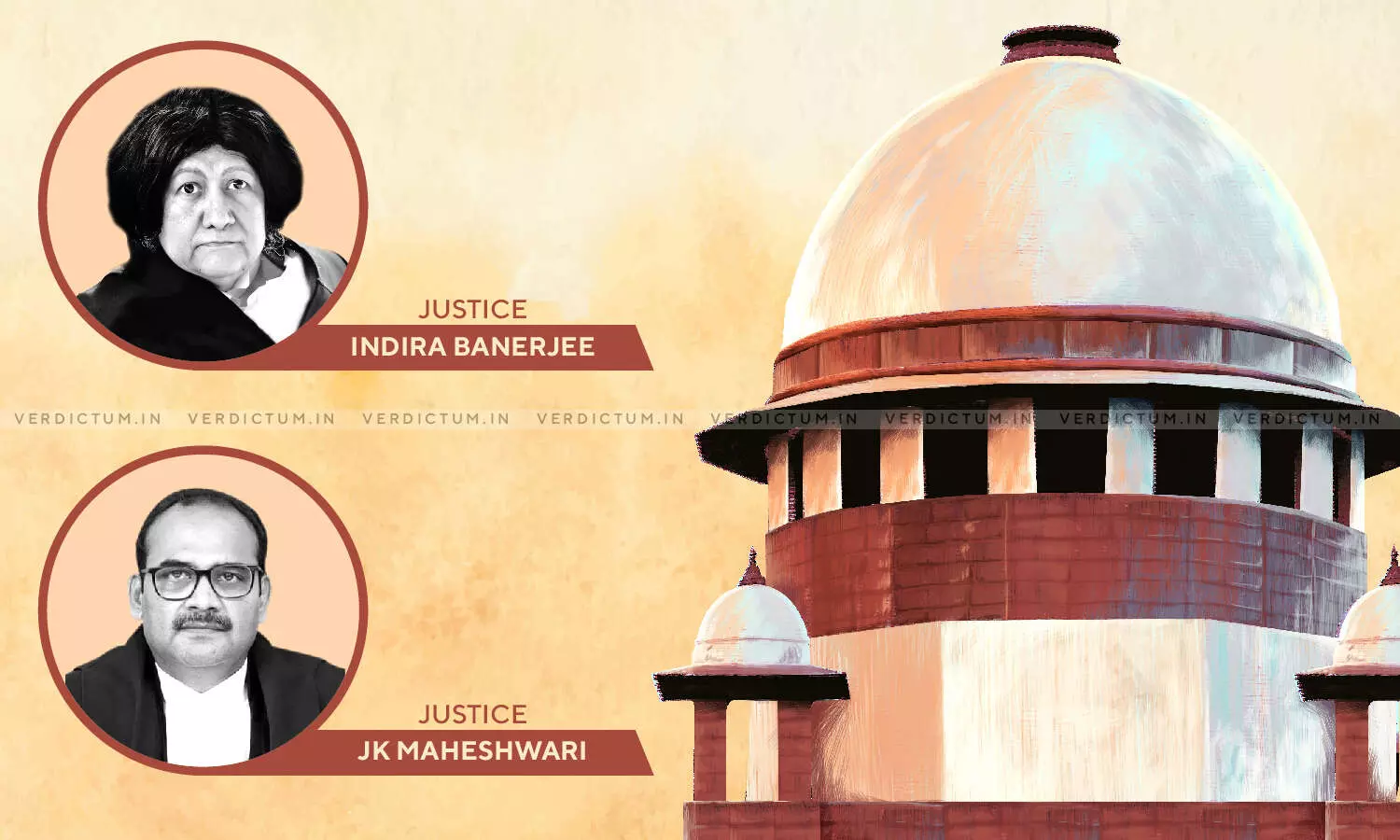
Cooling Off Period U/s. 13B(2) Of Hindu Marriage Act Is Directory - SC Waives The 6 Months Period
 |
|A two-judge Bench of Justice Indira Banerjee and Justice JK Maheshwari has held that the cooling-off period under section 13B (2) of the Hindu Marriage Act is directory in nature and not mandatory. The Supreme Court in this context, further held -
"The statutory waiting period of at least six months mentioned in Section 13B (2) of the Hindu Marriage Act was not mandatory but directory and that it would be open to the Court to exercise its discretion to waive the requirement of Section 13B(2), having regard to the facts and circumstances of the case, if there was no possibility of reconciliation between the spouses, and the waiting period would serve no purpose except to prolong their agony."
Advocate Mr. Vikram Hegde appeared for the Appellant before the Supreme Court.
The Apex Court was hearing an appeal against an order passed by the Punjab and Haryana High Court which had dismissed the civil revisional application filed by the Appellant-Husband against an order of the Family Court, Hisar which disallowed the waiving of the cooling period. The Bench before quashing the order observed -
"The object of Section 13B (2) read with Section 14 is to save the institution of marriage, by preventing hasty dissolution of marriage. It is often said that "time is the best healer". With the passage of time, tempers cool down and anger dissipates". But in the present case "Even after over 14 months of separation, the parties still want to go ahead with the divorce. No useful purpose would be served by making the parties wait, except to prolong their agony".
In this case, the Appellant, an IPS officer married the respondent, an IFS officer on 10th September 2020. But due to irreconcilable differences, they separated on 13th September, 3 days after the marriage. On 30th September 2021 after a period of one year of living separately, the Appellant and Respondent moved a petition in family court, Hisar to obtain a decree of divorce by mutual consent. The Family Court dismissed the petition by relying on Amardeep Singh v Harveen Kaur 2017 (4) RCR Civil (608) to assert that the present case doesn't satisfy the condition of completing the statutory period of one year mentioned in 13B (1) of the Hindu Marriage Act before moving to the court for first motion. The High Court also reasoned that 1 ½ year must have elapsed before moving to the Court. Aggrieved by the said order the appellant moved to the Supreme Court.
The Apex Court while referring to the Hindu Marriage Act observed, "The provisions of the Hindu Marriage Act evince inherent respect for the institution of marriage, which contemplates the sacramental union of a man and a woman for life. However, there may be circumstances in which it may not reasonably be possible for the parties to the marriage to live together as husband and wife."
Relevance of Section 13B
The Court in this context gave the following observations -
"Section 13B incorporated in the Hindu Marriage Act with effect from 27.5.1976, which provides for divorce by mutual consent, is not intended to weaken the institution of marriage. Section 13B puts an end to collusive divorce proceedings between spouses, often undefended, but time-consuming by reason of a rigmarole of procedures. Section 13B also enables the parties to a marriage to avoid and/or shorten unnecessary acrimonious litigation, where the marriage may have irretrievably broken down and both the spouses may have mutually decided to part."
"But for Section 13B, the defendant spouse would often be constrained to defend the litigation, not to save the marriage, but only to refute prejudicial allegations, which if accepted by Court, might adversely affect the defendant spouse."
The Court further noted that the cooling-off period as provided under Section 13(B)(2) of the Act is for the parties to decide whether they to want to resolve their differences amicably or go ahead with the divorce.
"Where there is a chance of reconciliation, however slight, the cooling period of six months from the date of filing of the divorce petition should be enforced. However, if there is no possibility of reconciliation, it would be meaningless to prolong the agony of the parties to the marriage. Thus, if the marriage has broken down irretrievably, the spouses have been living apart for a long time, but not been able to reconcile their differences and have mutually decided to part, it is better to end the marriage, to enable both the spouses to move on with the life," the Bench opined.
Present case
The Court additionally observed, "In this case, the parties are both well-educated and highly placed government officers. They have been married for about 15 months. The marriage was a non-starter. Admittedly, the parties lived together only for three days, after which they have separated on account of irreconcilable differences. The parties have lived apart for the entire period of their marriage except for three days. It is jointly stated by the parties that efforts at reconciliation have failed. The parties are unwilling to live together as husband and wife. Even after over 14 months of separation, the parties still want to go ahead with the divorce. No useful purpose would be served by making the parties wait, except to prolong their agony."
In the light of these observations, the Court allowed the appeal and set aside and quashed the impugned order of the High Court.
Click here to read/download the Judgment